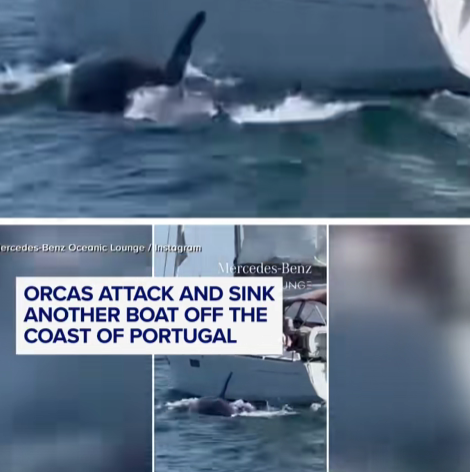The waters off Portugal’s coast have become the stage for yet another dramatic encounter between humans and orcas, as reports confirm that a pod of the massive marine predators attacked and sank a sailing vessel this week. The alarming trend, which has been escalating over the past few years, has left sailors rattled and marine experts scrambling for answers.
The latest incident was captured on video, showing several orcas circling and ramming into the hull of the boat. The vessel, unable to withstand the repeated blows, eventually took on water and sank. Fortunately, the crew managed to radio for help and were rescued before tragedy struck. No human lives were lost, but the attack has once again highlighted the growing risk sailors face in these waters.
Witnesses described the encounter as terrifying. “They came out of nowhere,” one sailor recalled. “First, we felt a jolt, then another, and before we knew it, the boat was tipping and taking water. It was like they knew exactly what they were doing.”
Researchers have been studying this unusual orca behavior for years. Unlike typical orca hunting strategies, these attacks seem highly targeted against boats, specifically yachts and sailing vessels. Many marine biologists suspect that the behavior originated with a single orca, nicknamed “White Gladis,” and spread socially through the pod. Orcas are known for their intelligence and ability to imitate behaviors, which may explain why the attacks have continued and even multiplied.
While some experts argue that the orcas may see the boat rudders as playthings or threats, others believe the behavior could stem from a traumatic encounter with a vessel in the past. “This isn’t random,” one scientist explained. “It’s coordinated, repeated, and passed down. That makes it both fascinating and frightening.”
In Portugal and Spain, sailors have grown increasingly wary of the so-called “orca hotspots.” Many now avoid certain routes altogether, while maritime authorities have issued warnings and advice on how to handle encounters. Recommendations include cutting the engine, avoiding sudden movements, and waiting until the orcas lose interest. Still, when these massive animals strike in unison, few boats can withstand the assault.
The latest sinking adds to a growing list of similar incidents across the Iberian Peninsula. While the number of attacks remains relatively small compared to the overall traffic in the area, their frequency and intensity have surged in recent months, raising concerns about safety and the long-term implications of human-marine life conflict.
Social media has exploded with reactions to the news, with some users dubbing the phenomenon the “Orca Uprising.” Memes, theories, and debates rage on, with opinions split between awe at the animals’ intelligence and fear of their power.
For now, sailors in Portuguese waters are on high alert. The sinking of yet another vessel serves as a stark reminder of nature’s unpredictability — and the fact that even the most intelligent and majestic creatures can become formidable adversaries when their behavior shifts.
